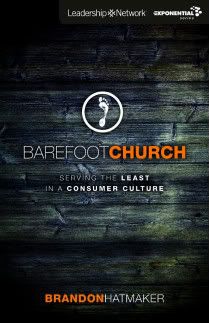 Not long ago I had an opportunity to hang out a bit with Hugh Halter and Matt Smay, authors of “The Tangible Kingdom”. I love being challenged from guys who live their faith out of the box. I love it when I’m forced to ask questions I might not normally ask. It’s good to increase our exposure. Many times it can open our eyes and take us places we wouldn’t have gone on our own.
Not long ago I had an opportunity to hang out a bit with Hugh Halter and Matt Smay, authors of “The Tangible Kingdom”. I love being challenged from guys who live their faith out of the box. I love it when I’m forced to ask questions I might not normally ask. It’s good to increase our exposure. Many times it can open our eyes and take us places we wouldn’t have gone on our own.
Hugh was sharing from Jesus’ instruction to Peter in Matthew 16:
“And I tell you that you are Peter, and on this rock I will build my church, and the gates of Hades will NOT overcome it. I will give you the keys of the kingdom of heaven; whatever you bind on earth will be bound in heaven, and whatever you loose on earth will be loosed in heaven.” Matthew 16:18-19
His thought was that as we think about the Kingdom of Heaven, many times we think of it as standing in opposition to the Kingdom of Hell. But that is not what Jesus called it. He didn’t call Hell a Kingdom. Jesus said that instead we should see it as a gate. He said the “gates” will not overcome the church. He drew light to the fact that the gates were keeping us from passing through and experiencing the Kingdom of Heaven. It’s not something we should just “avoid” and stay clear of. He reminded us that they are a serious threat to our advancement. Our typical response is to “Defend” our faith, our ways, our church, our tradition, our methods… but what we need to be doing instead is seeing the threat for what it is and go on the offense.
I guess what he is saying is that the “best offense” isn’t always a great defense… sometimes it really is a great offense.
“When they learned that the ark of the LORD had come into the camp, the Philistines were afraid. “A god has come into the camp,” they said. “We’re in trouble! Nothing like this has happened before. Woe to us! Who will deliver us from the hand of these mighty gods? They are the gods who struck the Egyptians with all kinds of plagues in the desert. Be strong, Philistines! Be men, or you will be subject to the Hebrews, as they have been to you. Be men, and fight!” So the Philistines fought, and the Israelites were defeated and every man fled to his tent. The slaughter was very great; Israel lost thirty thousand foot soldiers.” 1 Samuel 4:6-10
Okay, this is going to be a weird twist of thought. But here it goes: We should learn from our enemies (The Philistines). What was the lesson to be learned in 1 Samuel 4? They saw a serious threat, they acknowledged how serious it was, and they attacked it with all they had. They didn’t dig in and create a stronger defense, instead in their fear, they “strapped it on” and attacked.
I love it that the Philistines realized the magnitude of their threat. They were legitimately scared. So many times we are overtaken because we underestimate the strength and cause of our strife. Especially in leadership, we at times deceive ourselves. It’s too easy to pretend everything is okay. Julia Duin, religion writer for the Washington post in her book “Quitting Church”, said that
in all my research the most baffling thing to me is the fact that Pastors are in denial of what’s going on in the American church culture. If the pastors are in denial, their flock will be too.
It’s too easy to get tunnel vision and defend our path. I heard once that the greatest threats to the church is when we don’t think we are in crisis, when we pretend everything is going great and it’s not. When in fact the church thrives in crisis. Just look at countries where church is “underground”. They hold some of the largest churches and are experiencing some of the greatest revivals in the world.
But let’s look at us for a moment. Forget the stats that say many are leaving church. Let’s take a moment to look at those who remain. Since I can remember the typical thought is that 20% of the church is doing 80% of everything, not just the giving, but the leading, the serving, living on mission, etc… in some churches it’s 10% doing 90% (and it’s been this way for a long time). Guess what? If our main goal is to make disciples and to equip the body for works of service, then what we’re doing is not working. To 80% of our people, what we say is really irrelevant to their lives. Hearts are not increasingly changing and compassion is not increasingly growing. We’ve lost ground for those who leave, for those who stay, we’re simply maintaining 20%. Are we okay with that? If any of my kids came home with a 20% on their report card, I’d have a cow. That’s not even close to being acceptable. We’re only perpetuating it if we don’t address it. It’s a fact that people are leaving the organized church in droves… let’s start looking deeper at the why. Let’s start asking some tough questions. And let’s start listening to the answers.
I believe we need to look at the big picture of what God is doing in the Kingdom, and fight. We already know the answer to who wins. Jesus said the Gates of Hell will not prevail. So let’s attack them.
How? How about with the methods Jesus mandated we live. How about starting with love and compassion. How about putting people before process and keeping them there. What if we took the time to evaluate where the greatest physical, emotional, relational, and spiritual needs are in our city and make a plan of attack to both meet needs and make disciples. How about we make the sacrifices to show genuine concern for others. How about a concern for the least of the least, those without hope. How about we pour into people as if we truly loved them as we love ourselves. How about we give of ourselves for others and not just our personal agendas. We’ll have to consciously fight for that, because of our selfish nature. How about we listen to the other part of Matthew 16 where Jesus reminded us that on this rock, if we trust His ways, HE not us, will build His church. He gave us the keys to the Kingdom not to “our” church.
Jesus knows this goes against our fleshly nature. This is a battle we all struggle with daily, but as leaders we must work diligently to lead people towards this. It’s not only worthy of our efforts, it’s biblical, and it will work. This is a battle I find myself in the middle of, and I’m not going to stop fighting.
